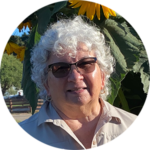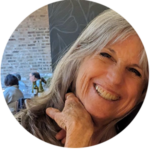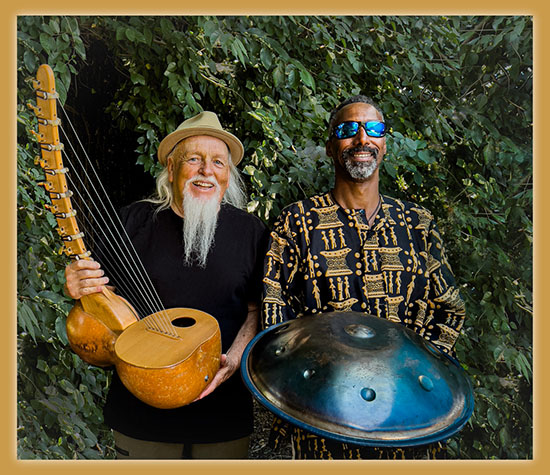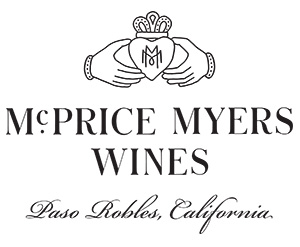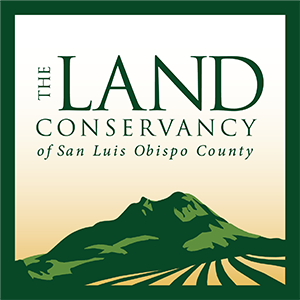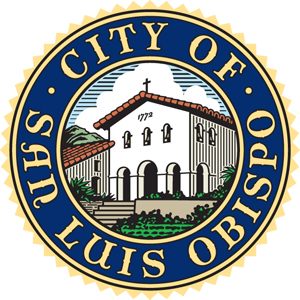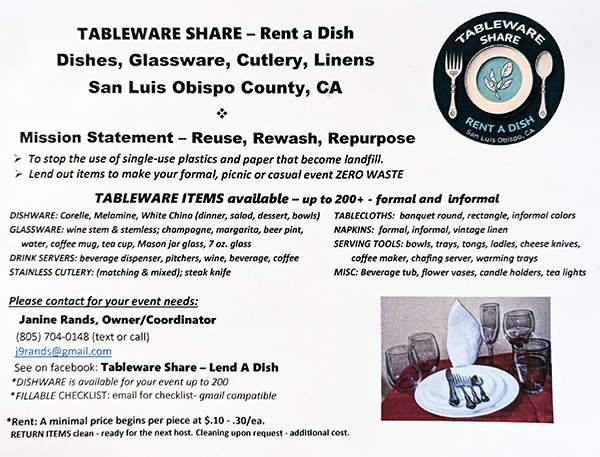THE BIONEERS ARE BACK!
Ecologistics® Presents:
2024 Central Coast Bioneers Conference,
A Bioneers Pollinator Event
October 4th and 5th
Historic Octagon Barn, 4400 Octagon Way, San Luis Obispo
Pre-registration is now Closed. Tickets will be available at the door.

Pre-Conference Field Trip - SOLD OUT

Time: 2:00-4:30 pm
Fee: SOLD OUT
Four All-electric Buildings to Reduce the Carbon Footprint
On this tour, you’ll have an inside look at all-electric green buildings that are energy efficient and powered completely or in part with renewable energy, reducing their carbon footprints. The tour will cover one commercial building and three residential projects in San Luis Obispo. If you’re thinking about decarbonizing your home or office, this is a great showcase of projects to inspire you.
Presented in partnership with the Tri-Counties Regional Energy Network, 3C-REN.
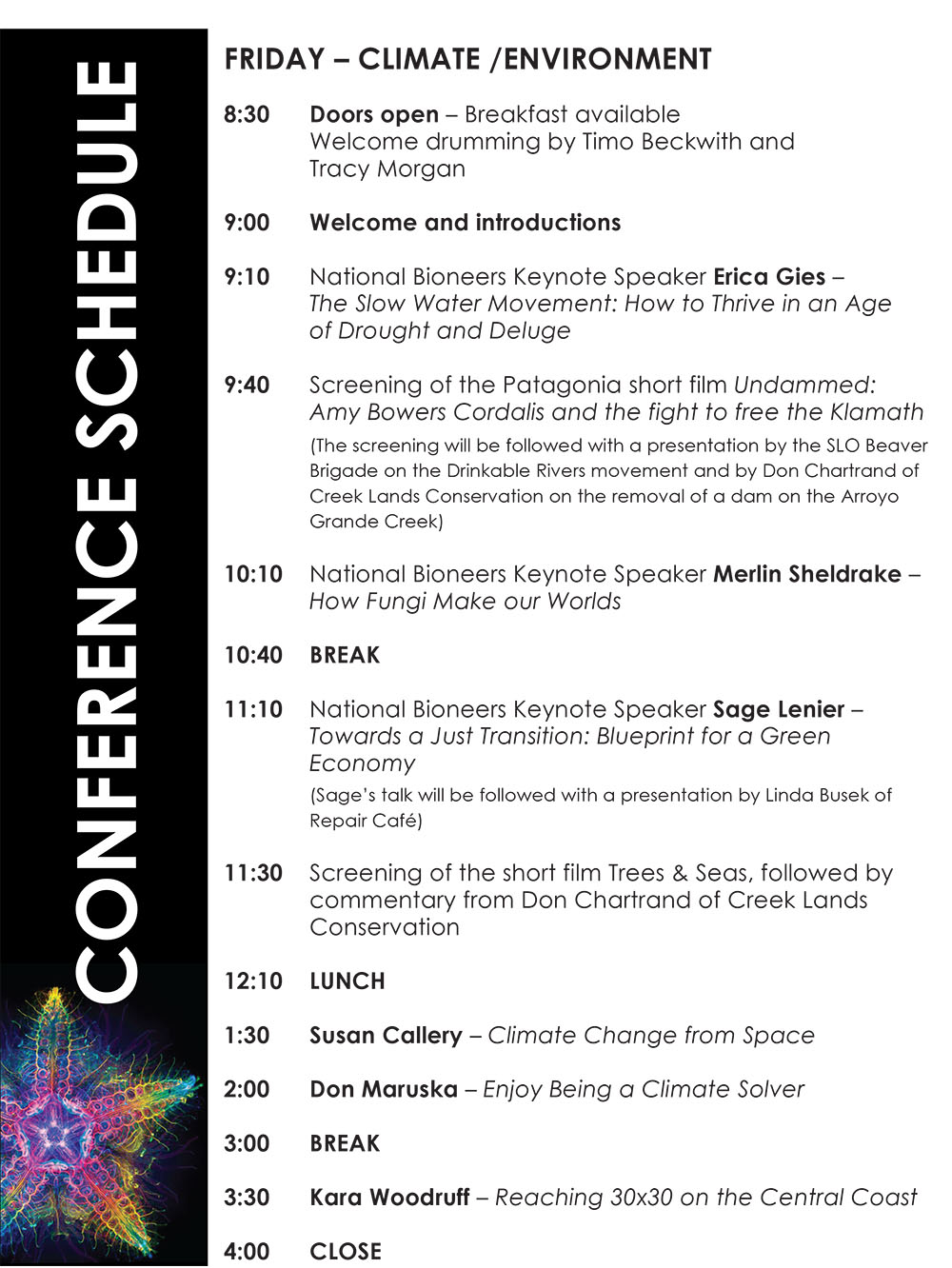
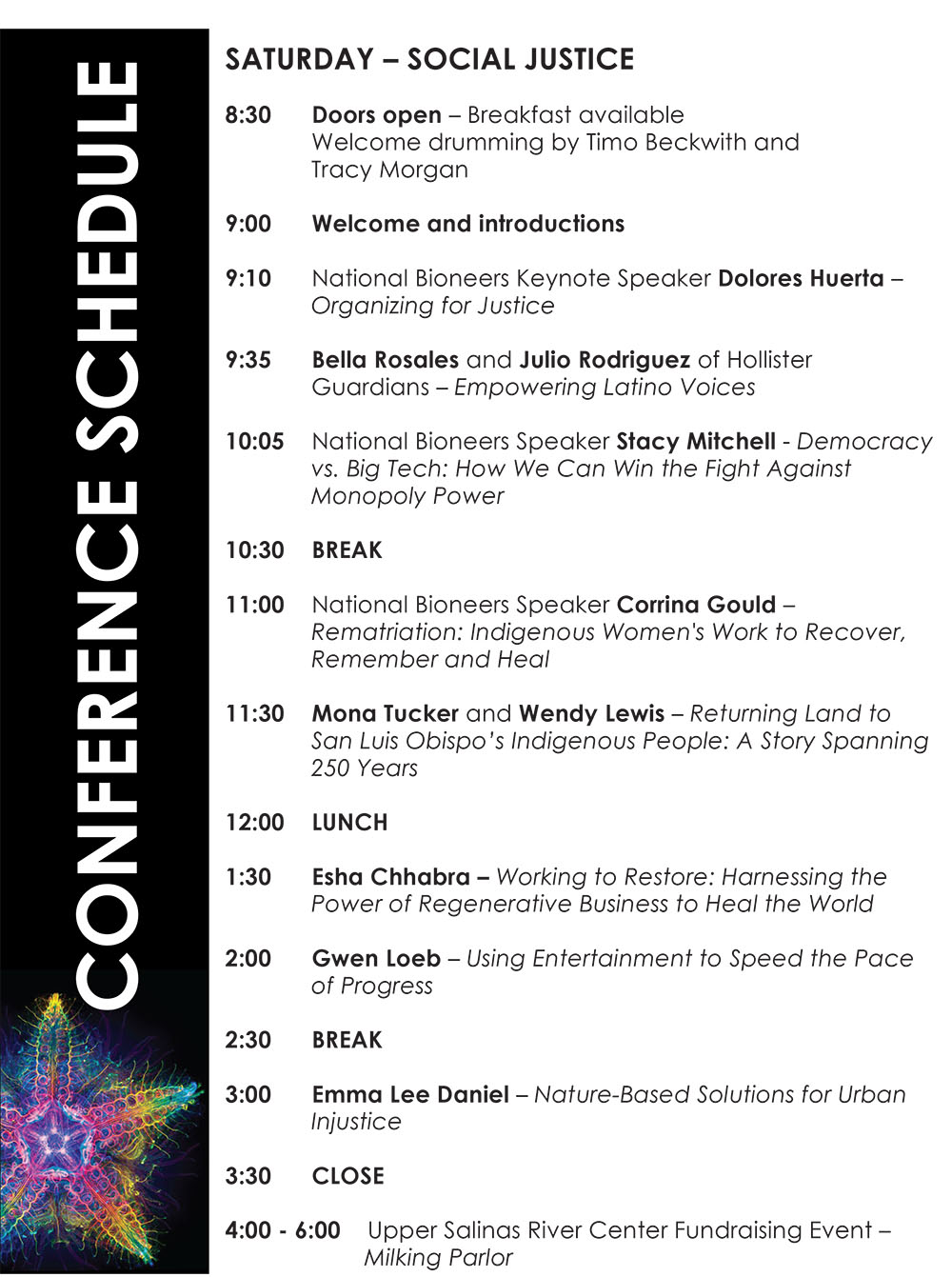
Bioneers Keynotes as Recorded at the National Bioneers Conference

Erica Gies, Author & Journalist
Increasingly frequent floods and droughts amplified by climate change inevitably spur calls for higher levees, bigger drains, and longer aqueducts. But this engineered infrastructure designed to control water, along with urban sprawl and industrial agriculture and forestry, are actually making water disasters far worse. Now some scientists, farmers, landscape architects and urban planners are asking a revolutionary question: “What does water want?” Our current forms of “development” speed water away and destroy wetlands, floodplains, and forests that normally absorb floods, store water for droughts, and grow food. But now, practitioners of the Slow Water movement like Erica Gies—inspired by geology, microbes, beavers, older cultures, and cutting-edge science—are showing us that we can make space for water within our human habitats and collaborate with natural systems to forge a more resilient future. Introduction by Teo Grossman, President of Bioneers.

Merlin Sheldrake, Biologist and Writer
Most fungi live out of sight, yet they make up a massively diverse kingdom of organisms that support and sustain nearly all living systems. The symbiotic mycorrhizal networks formed by plants and fungi comprise an ancient life-support system that easily qualifies as one of the wonders of the living world. Yet climate change strategies, conservation agendas and restoration efforts overlook fungi and focus overwhelmingly on animals and plants. This is a problem: the destruction of underground fungal networks accelerates both climate change and biodiversity loss and interrupts vital global nutrient cycles. In this session, Merlin Sheldrake, the biologist and bestselling author of Entangled Life: How Fungi Make our World, drives home just how critically important fungi are and discuss the visionary work of the Society for the Protection of Underground Networks (SPUN) and its efforts to map and protect the mycorrhizal fungal communities of the planet. He also presents cutting-edge research into the flow dynamics of carbon and nutrients within mycorrhizal fungal networks. Introduction by Toby Kiers, Ph.D., Executive Director and Chief Scientist, SPUN

We spend a lot of time talking about the ecological crisis, and not nearly enough talking about real, workable solutions. If the ultimate goal is to keep fossil fuels in the ground, how must we transform our economy to make that possible? Award-winning activist and innovative educator, Sage Lenier, one of the most impressive young leaders to emerge in recent years, takes to the stage to shed light on what a realistic and just transition looks like, and the role we can each play in leading us towards a more circular and equitable economy.

Dolores Huerta, President and Founder, Dolores Huerta Foundation
Dolores Huerta, now 93 and still going strong, is a genuine living legend, one of the most influential labor activists in U.S. history as well as a foundational leader of the Chicano civil rights movement. Huerta’s 7 decades of activism have included co-founding the world-renowned United Farm Workers’ Union with César Chávez, leading major strikes and consumer boycotts, negotiating contracts, and tirelessly advocating for safer working conditions (including the elimination of harmful pesticides) and for unemployment and healthcare benefits for agricultural workers. In this talk, she draws from her decades of experience to share her thoughts on the critical importance of organizing unions in all sectors of the economy to fight for a fairer society, and on how to build more unity between labor, social, racial, gender, and climate justice movements. Introduction by Film Producer, Writer and Director Peter Bratt.
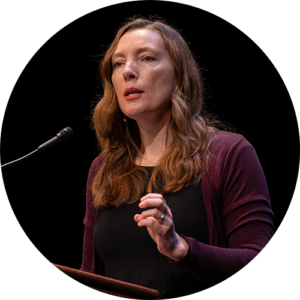
Stacy Mitchell, Co-Executive Director, Institute for Local Self-Reliance
Most of us would like to live in a society accountable to people and the planet, one in which we exercise genuine agency over our lives and have a real say in the decisions that affect our communities, but the dramatic increase in corporate domination, especially the rise of giant tech companies that wield unprecedented levels of surveillance and control, is radically undermining our democracy and concentrating wealth and power in fewer and fewer hands. Stacy Mitchell, who has long been at the forefront of the national movement to rein in excessive corporate power and reinvigorate local self-reliance, is here to tell us that, as powerful as these immense companies and their political allies may seem, they’ve finally met their match. A broad grassroots alliance, together with a new generation of creative government leaders, is bringing long-dormant anti-monopoly laws and strategies back to life. This promising turn of events, Stacy will explain, offers hope for reclaiming our rights and assuring a far more equitable and greener future. Introduction by Kenny Ausubel, Bioneers Co-Founder and CEO.
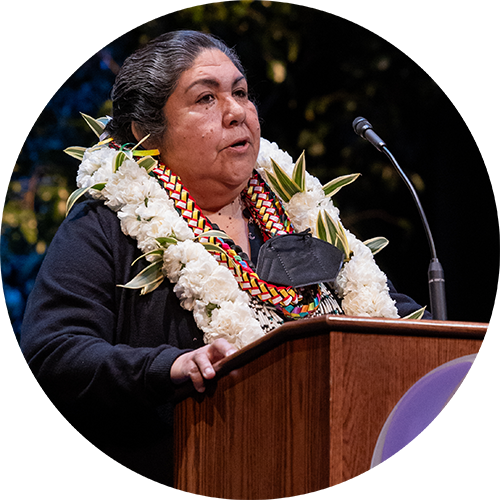
Corrina Gould, (Lisjan Ohlone) Co-Founder and Lead Organizer, Sogorea Te’ Land Trust
Returning to open this year’s conference, one of the leading figures in the East Bay Indigenous community and a longtime activist for First People’s rights and the protection of land and waters globally, Corrina Gould, focuses on the concept and practice of “Rematriation,” which involves reclaiming traditional land and sacred sites to help rebuild traditional cultures and heal the deep wounds inflicted by colonization and genocide and also prioritizes the unique role women play in that enormous undertaking. Introduction by Cara Romero, Director of Bioneers’ Indigeneity Program.
Local Presenters

Climate Change from Space
NASA has studied Earth since 1960 from space, aircraft, and boots on the ground. Learn about Earth’s changing climate from NASA’s unique perspective through amazing photos, visualizations, and graphics that bring the causes and impacts of climate change into focus.

Reaching 30x30 on the Central Coast
Kara Woodruff, District Director/Sr. Policy Advisor for Senator John Laird
30×30 is a global initiative for governments to permanently conserve 30% of Earth’s land and waters by the year 2030. This presentation will summarize the projects along the Central Coast (including San Luis Obispo, Monterey, and Santa Cruz counties) that will help California achieve its ambitious 30×30 biodiversity goals.

Working to Restore: Harnessing the Power of Regenerative Business to Heal the World
Esha will dig into the new era of regenerative businesses going beyond sustainability. She’ll dive into what the term regenerative even means in today’s landscape, how companies can build businesses that have impact layered into them at each stage, and still remain profitable.

Using Entertainment to Speed the Pace of Progress
Gwen Loeb, CEO and Co-Founder of World Builders Incubator
Solutions exist for nearly all social and environmental issues, but it takes decades to build the collective support for implementation. Entertainment is a proven tool for bridging divides and shifting cultural norms. By bringing Thought Leaders and Creatives together, World Builders Incubator (WBI) is developing a pipeline of mass-market, solutions-focused fiction — TV, Films, Books, Plays, Video Games, Podcasts, and more — designed to inspire imaginations and build widespread support. With solutions-focused entertainment we can speed the process of turning hopeful possibilities into daily realities.
Bonus: Central Coast Bioneers participants will get the first peak at WBI’s groundbreaking Wheel of Possibilities. Housed on our website and shared with the world, the Wheel of Possibilities will feature Solutions for 50 environmental and social issues.

Nature-Based Solutions for Urban Injustice
In Los Angeles, historic socioecological injustices have resulted in unequal access to trees, parks, and green infrastructure, negatively impacting environmental and community health. GIS spatial analysis and critical mapping reveal a strong correlation between 1930s redlining maps and current environmental burdens in marginalized communities. This study uses measures of tree canopy, park access, and climate change projections of rising temperatures and urban flooding as indicators to identify areas most affected. By evaluating vulnerability indicators within urban watersheds rather than census tracts, the study proposes how Nature-Based Solutions can be more equitably distributed, effectively managing stormwater and fostering healthier, more resilient communities.
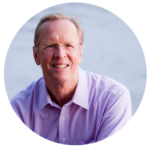
Enjoy Being a Climate Solver
See how you can combine what you love to do with what needs to be done for a healthy climate. Don Maruska, author of “Solve Climate Change Now: Do What You Love for a Healthy Planet,” will guide you in a quick, impactful Climate Action Conversation. Discover your “climate sweet spot” to make a meaningful difference and have fun doing it. Don has engaged people around the world in these conversations to boost awareness, actions, and advocacy needed for successful climate results. Enjoy Don’s can-do entrepreneurial spirt honed as founder and CEO of three Silicon Valley companies and now shared as a Master Certified Coach helping others succeed in their careers and organizations.
Empowering Latino Voices
Hollister Guardians’ mission is to empower historically ignored members of Hollister by educating them on how to effectively advocate for their interests on environmental and land use issues that affect their quality of life. They are currently organizing underserved Westside residents of Hollister who have long faced barriers to the political process. Bella Rosales and Julio Rodriguez of Hollister Guardians will talk about their work to protect the interests of the residents who live near the Westside sewer facility and near the Sandman Mine on the San Benito River.
Returning Land to San Luis Obispo‘s Indigenous People: A Story spanning 250 Years
The Chumash people have inhabited this area for at least 13,000 years, living in a network of villages. Spanish explorers arrived in 1769, and Franciscan friars and soldiers established settlements and missions on the Chumash’s land. The YTT Northern Chumash Tribe of San Luis Obispo County were forcibly removed from their ancestral lands in the 1700s without compensation or agreement. The Mexican government gave away the Diablo Lands through land grants after the mission system collapsed, making the land private property. Mona Olives Tucker and Wendy Lucas will discuss the current juncture where the YTT Northern Chumash could once again become stewards of their homelands.

Screening of the Patagonia short film
Undammed: Amy Bowers Cordalis and the fight to free the Klamath
After witnessing a massive fish kill on her ancestral home waters, Yurok tribal attorney Amy Bowers Cordalis dedicated her life to reversing the generations-long destruction wrought by the Klamath River dams. Undammed follows her journey to free the Klamath, from testifying before Congress to passing down fishing traditions within her young family.
Screening will be followed by a presentation by the SLO Beaver Brigade on Drinkable Rivers. https://drinkablerivers.org/
Photo: Josh Miller
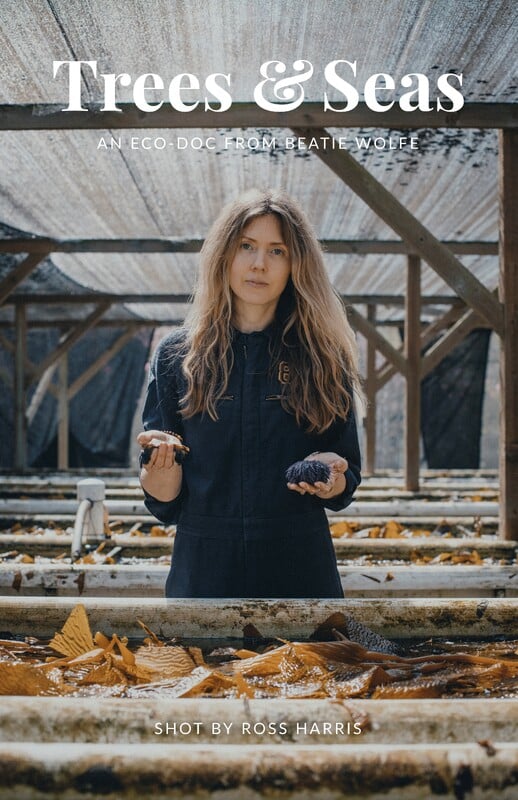
Screening of the film Trees & Seas
An Eco Doc by Beatie Wolfe
Trees & Seas’ is an Eco-Doc from artist Beatie Wolfe (shot by indie filmmaker Ross Harris) which uses Wolfe’s guitar as a lens to explore key local conservation initiatives in California across its land and ocean.
Have you ever wondered how the tools of your trade can be crafted with the climate in mind? Artist Beatie Wolfe was inspired to explore just that via her guitar and its materials, taking us on a journey from CalFire’s reclaimed urban wood initiative to NOAA’s abalone rewilding efforts; looking at how we can build new sustainable circular economies, while drawing wisdom from the true custodians of the land.
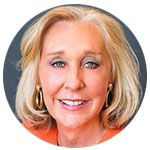
Denise Dudley

Drumming each morning by TnT Project
Fundraising Kickoff Event
Upper Salinas River Center
Join Us for an Afternoon of Celebration and Support
Upper Salinas River Center Fundraising Event
Ecologistics and the SLO Beaver Brigade are thrilled to invite you to an unforgettable afternoon at the Upper Salinas River Center Fundraising Event, dedicated to supporting the development of our much-anticipated new River Center.
Event Details:
Date: Saturday, October 5
Time: 4:00 pm to 6:00 pm
Venue: Milking Parlor at the Octagon Barn Event Center, 4400 Octagon Way
The Upper Salinas River Center will be a hub of discovery, offering immersive experiences that inspire a deep sense of wonder and reverence for our watershed. Through interactive science, art, storytelling and research, the center will serve as a catalyst for environmental connection and ecological restoration, promoting the stewardship and revitalization of the Salinas River. This event will not only showcase the exciting future of the River Center but will also provide an opportunity for you to contribute to its realization.
The event will feature a sensory tasting by Chef Katie Prescott of 805 Coastal Kitchen and wines donated by local wineries.
Your presence and support are vital as we embark on this journey to enrich our community and celebrate the natural beauty of our river. Together, we can turn our vision into reality and create a lasting legacy for future generations.
We look forward to celebrating with you and working together to bring the Upper Salinas River Center to life!
Wines Donated By:
What is a sensory tasting?
A sensory wine tasting is a structured and systematic evaluation of wine using the human senses, primarily taste and smell. This type of tasting is designed to assess and appreciate the various sensory attributes of a wine, including its appearance, aroma, flavor, and mouthfeel. Sensory wine tastings are a great way to gain a deeper understanding and appreciation of different wines and expand your palate!
Our Fundraiser Sponsors
MEALS
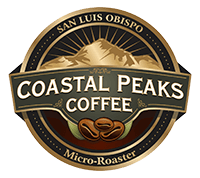
Breakfast will be provided by Coastal Peaks Coffee.
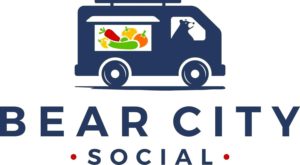
Lunch will be provided by Bear City Social – Farm to Street Mobile Kitchen
Bookstore
Featuring Volumes of Pleasure
The Central Coast Bioneers Conference bookshop since 2010.




